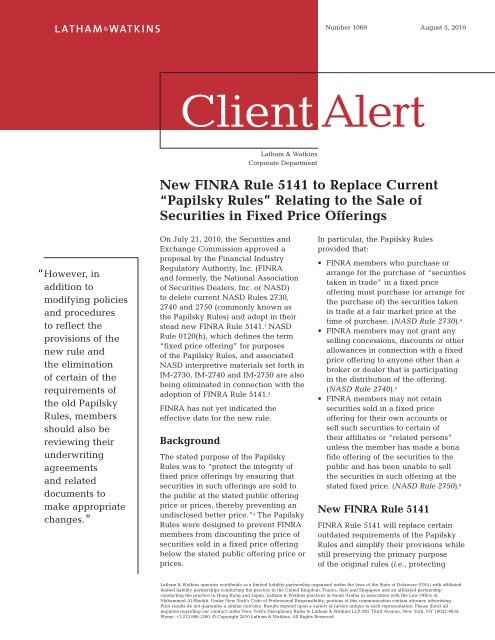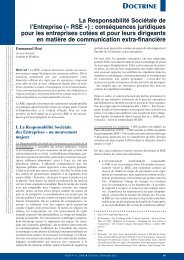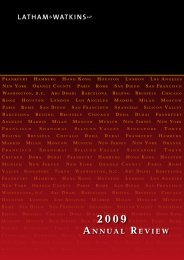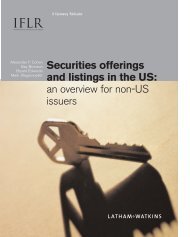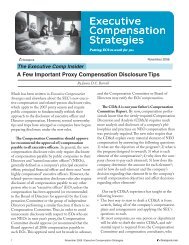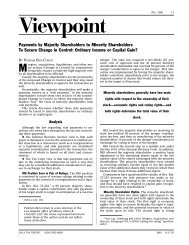Papilsky Rules - Latham & Watkins
Papilsky Rules - Latham & Watkins
Papilsky Rules - Latham & Watkins
Create successful ePaper yourself
Turn your PDF publications into a flip-book with our unique Google optimized e-Paper software.
Number 1069 August 5, 2010<br />
Client Alert<br />
<strong>Latham</strong> & <strong>Watkins</strong><br />
Corporate Department<br />
New FINRA Rule 5141 to Replace Current<br />
“<strong>Papilsky</strong> <strong>Rules</strong>” Relating to the Sale of<br />
Securities in Fixed Price Offerings<br />
“However, in<br />
addition to<br />
modifying policies<br />
and procedures<br />
to reflect the<br />
provisions of the<br />
new rule and<br />
the elimination<br />
of certain of the<br />
requirements of<br />
the old <strong>Papilsky</strong><br />
<strong>Rules</strong>, members<br />
should also be<br />
reviewing their<br />
underwriting<br />
agreements<br />
and related<br />
documents to<br />
make appropriate<br />
changes.”<br />
On July 21, 2010, the Securities and<br />
Exchange Commission approved a<br />
proposal by the Financial Industry<br />
Regulatory Authority, Inc. (FINRA<br />
and formerly, the National Association<br />
of Securities Dealers, Inc. or NASD)<br />
to delete current NASD <strong>Rules</strong> 2730,<br />
2740 and 2750 (commonly known as<br />
the <strong>Papilsky</strong> <strong>Rules</strong>) and adopt in their<br />
stead new FINRA Rule 5141. 1 NASD<br />
Rule 0120(h), which defines the term<br />
“fixed price offering” for purposes<br />
of the <strong>Papilsky</strong> <strong>Rules</strong>, and associated<br />
NASD interpretive materials set forth in<br />
IM-2730, IM-2740 and IM-2750 are also<br />
being eliminated in connection with the<br />
adoption of FINRA Rule 5141. 2<br />
FINRA has not yet indicated the<br />
effective date for the new rule.<br />
Background<br />
The stated purpose of the <strong>Papilsky</strong><br />
<strong>Rules</strong> was to “protect the integrity of<br />
fixed price offerings by ensuring that<br />
securities in such offerings are sold to<br />
the public at the stated public offering<br />
price or prices, thereby preventing an<br />
undisclosed better price.” 3 The <strong>Papilsky</strong><br />
<strong>Rules</strong> were designed to prevent FINRA<br />
members from discounting the price of<br />
securities sold in a fixed price offering<br />
below the stated public offering price or<br />
prices.<br />
In particular, the <strong>Papilsky</strong> <strong>Rules</strong><br />
provided that:<br />
• FINRA members who purchase or<br />
arrange for the purchase of “securities<br />
taken in trade” in a fixed price<br />
offering must purchase (or arrange for<br />
the purchase of) the securities taken<br />
in trade at a fair market price at the<br />
time of purchase. (NASD Rule 2730). 4<br />
• FINRA members may not grant any<br />
selling concessions, discounts or other<br />
allowances in connection with a fixed<br />
price offering to anyone other than a<br />
broker or dealer that is participating<br />
in the distribution of the offering.<br />
(NASD Rule 2740). 5<br />
• FINRA members may not retain<br />
securities sold in a fixed price<br />
offering for their own accounts or<br />
sell such securities to certain of<br />
their affiliates or “related persons”<br />
unless the member has made a bona<br />
fide offering of the securities to the<br />
public and has been unable to sell<br />
the securities in such offering at the<br />
stated fixed price. (NASD Rule 2750). 6<br />
New FINRA Rule 5141<br />
FINRA Rule 5141 will replace certain<br />
outdated requirements of the <strong>Papilsky</strong><br />
<strong>Rules</strong> and simplify their provisions while<br />
still preserving the primary purpose<br />
of the original rules (i.e., protecting<br />
<strong>Latham</strong> & <strong>Watkins</strong> operates worldwide as a limited liability partnership organized under the laws of the State of Delaware (USA) with affiliated<br />
limited liability partnerships conducting the practice in the United Kingdom, France, Italy and Singapore and an affiliated partnership<br />
conducting the practice in Hong Kong and Japan. <strong>Latham</strong> & <strong>Watkins</strong> practices in Saudi Arabia in association with the Law Office of<br />
Mohammed Al-Sheikh. Under New York’s Code of Professional Responsibility, portions of this communication contain attorney advertising.<br />
Prior results do not guarantee a similar outcome. Results depend upon a variety of factors unique to each representation. Please direct all<br />
inquiries regarding our conduct under New York’s Disciplinary <strong>Rules</strong> to <strong>Latham</strong> & <strong>Watkins</strong> LLP, 885 Third Avenue, New York, NY 10022-4834,<br />
Phone: +1.212.906.1200. © Copyright 2010 <strong>Latham</strong> & <strong>Watkins</strong>. All Rights Reserved.
<strong>Latham</strong> & <strong>Watkins</strong> | Client Alert<br />
the integrity of the fixed price offering<br />
process).<br />
Specifically, as approved by the SEC,<br />
FINRA Rule 5141 provides that no<br />
FINRA member that:<br />
participates in a selling syndicate or<br />
selling group or that acts as the single<br />
underwriter in connection with a fixed<br />
price offering shall offer or grant,<br />
directly or indirectly, to any person or<br />
account that is not a member of such<br />
selling syndicate or selling group or<br />
that is a person or account other than<br />
the single underwriter any securities<br />
in the offering at a price below the<br />
stated public offering price (reduced<br />
price). 7<br />
FINRA Rule 5141(b) states, however,<br />
that this general prohibition will not<br />
impact the ability of members of a<br />
selling syndicate or selling group to<br />
purchase and sell securities in the<br />
offering among themselves. Moreover,<br />
dispensing with the prohibition currently<br />
contained in NASD Rule 2750, new<br />
FINRA Rule 5141 expressly permits<br />
(subject to the restrictions contained in<br />
FINRA Rule 5130) 8 a single underwriter<br />
or member of the selling syndicate or<br />
selling group to sell securities in the<br />
offering to an affiliated person so long<br />
as the affiliated person purchases the<br />
securities at the fixed public offering<br />
price and not at a “reduced price.” 9<br />
Supplementary material provided in<br />
respect of FINRA Rule 5141 clarifies<br />
that the term “reduced price” includes,<br />
without limitation, the offer or grant<br />
of any “selling concession, discount<br />
or other allowance, credit, rebate,<br />
reduction of any fee (including any<br />
advisory or service fee), any sale of<br />
products or services at prices below<br />
reasonable commercially available rates<br />
for similar products and services . . .<br />
or any purchase of or arrangement to<br />
purchase securities from the person or<br />
account at more than their fair market<br />
price in exchange for securities in the<br />
offering.” 10<br />
The new rule continues to provide an<br />
exception with respect to the provision<br />
of “research.” In particular, FINRA<br />
Rule 5141 will not prevent a member<br />
from selling securities in a fixed price<br />
offering to a person or account to which<br />
it has provided research so long as the<br />
recipient of the research pays the stated<br />
public offering price for the securities<br />
and the research is provided pursuant to<br />
the requirements of Section 28(e) of the<br />
Securities Exchange Act of 1934. 11<br />
The new rule also provides guidance<br />
to FINRA members that also serve as<br />
investment advisers, noting that such<br />
a member “may exempt securities<br />
that are purchased as part of a fixed<br />
price offering from the calculation of<br />
annual or periodic asset-based fees that<br />
such member charges to a customer,<br />
provided such exemption is part of the<br />
member’s normal and ordinary course<br />
of business with the customer and is<br />
not in connection with an offering.” 12<br />
Although the new rule does not address<br />
the alternative practice employed by<br />
certain participating members whereby<br />
two fixed public offering prices are<br />
disclosed — one price that includes the<br />
full underwriting discount and a second<br />
price that excludes all or a portion of the<br />
underwriting discount and is applicable<br />
to those purchasers who already pay<br />
asset-based fees to the selling member<br />
— it would appear that this alternative<br />
practice should also continue to be<br />
permitted under the new rule provided<br />
the multiple fixed prices are adequately<br />
disclosed in the prospectus or other<br />
offering document.<br />
Practical Impact of the Rule<br />
Change<br />
FINRA has not yet indicated the<br />
implementation date for new FINRA<br />
Rule 5141. However, in addition to<br />
modifying policies and procedures to<br />
reflect the provisions of the new rule<br />
and the elimination of certain of the<br />
requirements of the old <strong>Papilsky</strong> <strong>Rules</strong>,<br />
2 Number 1069 | August 5, 2010
<strong>Latham</strong> & <strong>Watkins</strong> | Client Alert<br />
members should also be reviewing<br />
their underwriting agreements and<br />
related documents to make appropriate<br />
changes.<br />
Significantly, unlike NASD Rule<br />
2740(c), FINRA Rule 5141 does not<br />
require members to obtain the written<br />
agreement of non-US broker-dealers<br />
participating in a fixed price offering<br />
to comply with the provisions of the<br />
<strong>Papilsky</strong> <strong>Rules</strong> and NASD Rule 2420. 13<br />
FINRA Rule 5141 also does not require<br />
members to make quarterly filings with<br />
FINRA with respect to designated sales,<br />
nor does it require specific records to be<br />
kept and maintained by members that<br />
are designated by their customers to<br />
receive selling credit as now required by<br />
NASD Rule 2740 (although FINRA does<br />
note that such members remain subject<br />
to other applicable FINRA and SEC<br />
recordkeeping requirements). 14<br />
Moreover, new FINRA Rule 5141 may<br />
permit the establishment of certain<br />
referral and advisory arrangements<br />
previously thought to be prohibited<br />
by the literal words of current NASD<br />
Rule 2740. In particular, outside the<br />
parameters of an interpretive letter<br />
issued by FINRA (then NASD) staff<br />
in 2003, 15 most referral and advisory<br />
arrangements between a FINRA<br />
member that was participating in a<br />
fixed price offering and another entity<br />
that was not itself a broker-dealer that<br />
was also participating in the offering<br />
were thought to be impermissible<br />
under NASD Rule 2740 since the<br />
arrangement, if it involved the payment<br />
of compensation based on or tied to the<br />
amount of compensation received by<br />
the FINRA member in the fixed price<br />
offering, could be viewed as the grant<br />
(or sharing) of a concession or “other<br />
allowance” in connection with the fixed<br />
price offering. It now appears, however,<br />
that such an arrangement would not<br />
be prohibited by new FINRA Rule<br />
5141, provided it does not, directly or<br />
indirectly, confer a “reduced price” in<br />
respect of any securities purchased or<br />
sold in the offering, and, accordingly,<br />
should be permissible to the extent<br />
the terms of the arrangement are not<br />
inconsistent with NASD Rule 2420<br />
(or, assuming it is ultimately adopted,<br />
proposed FINRA Rule 2040) or any other<br />
applicable laws, rules and regulations.<br />
Finally, it is worth noting that new<br />
FINRA Rule 5141 provides that the<br />
prohibition with respect to selling the<br />
offered securities at a “reduced price”<br />
applies only “until the termination of<br />
the offering or until a member, having<br />
made a bona fide public offering of the<br />
securities, is unable to continue selling<br />
such securities at the stated public<br />
offering price.” 16 This language should<br />
preserve the ability of underwriters to<br />
change the initial offering price shown<br />
on the cover of the prospectus from<br />
time to time if they are unable to sell<br />
all the offered securities at such initial<br />
fixed offering price and, in connection<br />
with under-subscribed offerings, should<br />
continue to permit underwriters to<br />
place securities they are unable to<br />
sell to the public in the offering in an<br />
investment account or with an affiliate<br />
without running afoul of the rule. 17<br />
Accordingly, new FINRA Rule 5141<br />
should not change customary practices<br />
in connection with “sticky” deals.<br />
3 Number 1069 | August 5, 2010
<strong>Latham</strong> & <strong>Watkins</strong> | Client Alert<br />
Endnotes<br />
1<br />
See SEC Release No. 34-62539; File No.<br />
SR-FINRA-2010-029 (July 21, 2010). NASD<br />
<strong>Rules</strong> 2730, 2740 and 2750 are generally<br />
referred to as the “<strong>Papilsky</strong> <strong>Rules</strong>” because<br />
of the court decision with which they are often<br />
associated, <strong>Papilsky</strong> v. Berndt, Fed. Sec. L. Rep<br />
(CCH) 95,627 (S.D.N.Y. June 24, 1976).<br />
FINRA issued a notice to its members relating<br />
to the proposed rule on August 4, 2009 and<br />
originally submitted the rule proposal to the<br />
SEC shortly thereafter, but then withdrew it<br />
for technical reasons in November 2009. The<br />
proposed rule was re-submitted to the SEC,<br />
without substantive change, on May 27, 2010.<br />
See FINRA Regulatory Notice 09-45 (August<br />
2009) (FINRA Notice 09-45); SEC Release<br />
No. 34-62299 (June 16, 2010) (the Proposing<br />
Release).<br />
2<br />
The definition of “fixed price offering” is now set<br />
forth in the supplementary materials to FINRA<br />
Rule 5141 and is essentially unchanged from<br />
the definition currently set forth in NASD Rule<br />
0120(h). As so defined, the term “fixed price<br />
offering” refers to securities publicly offered<br />
(in whole or in part) in the United States at a<br />
stated offering price or prices. See FINRA Rule<br />
5141.04. The term includes offerings registered<br />
in the United States under the Securities Act<br />
of 1933, as well as offerings that, although<br />
public, are not required to be registered under<br />
the Securities Act pursuant to an applicable<br />
exemption (e.g., bank securities offered pursuant<br />
to Section 3(a)(2) of the Securities Act). The<br />
term, however, does not include offerings of<br />
securities that are privately placed or offered and<br />
sold pursuant to Rule 144A under the Securities<br />
Act. It is also important to note that the term<br />
“fixed price offering” does not prohibit “multiple<br />
price” offerings so long as the different fixed<br />
prices are adequately disclosed. See Proposing<br />
Release; NASD Notice to Members 81-3.<br />
3<br />
FINRA Notice 09-45.<br />
4<br />
NASD Rule 2730 was intended to prevent<br />
members from paying a higher price for the<br />
securities taken in trade, thereby lowering the<br />
purchase price of the securities purchased by<br />
the investor in the fixed price offering.<br />
5<br />
The purpose of NASD Rule 2740 was to prevent<br />
members from granting discounts to favored<br />
investors, such that those investors would be<br />
able to purchase securities in the offering at a<br />
lower price than other investors.<br />
6<br />
NASD Rule 2750 was intended to prevent<br />
purchasers from obtaining a discount through the<br />
establishment of an affiliated broker-dealer that<br />
would receive designated selling credit for the<br />
sale.<br />
7<br />
FINRA Rule 5141(a).<br />
8<br />
FINRA Rule 5130 generally prohibits FINRA<br />
members from selling equity securities offered<br />
in initial public offerings to certain “restricted<br />
persons” (a term which includes, among others,<br />
broker-dealers and certain persons having a<br />
beneficial interest in a broker-dealer).<br />
9<br />
FINRA Rule 5141.03 provides that ordinary<br />
course transactions between a member and its<br />
affiliates that are unrelated to the purchase or<br />
sale of securities in a fixed price offering will not<br />
be deemed to confer a “reduced price” under the<br />
rule.<br />
10<br />
FINRA Rule 5141.01.<br />
11<br />
FINRA Rule 5141.02.<br />
12<br />
FINRA Rule 5141.05.<br />
13<br />
The adoption of FINRA Rule 5141 does not<br />
impact existing NASD Rule 2420 (Dealing with<br />
Non-Members), although such rule is the subject<br />
of another pending FINRA rule proposal. See<br />
FINRA Regulatory Notice 09-69 (December<br />
2009) (proposing, among other things, to delete<br />
current NASD Rule 2420 and replace it with new<br />
FINRA Rule 2040) (FINRA Notice 09-69).<br />
Also note that current NASD Rule 2420(c)<br />
continues to require an agreement by any<br />
non-US broker-dealer that receives a selling<br />
concession, discount or other allowance from<br />
a FINRA member to agree to the restrictions<br />
set forth in the rule as if it were itself a FINRA<br />
member in respect of any sales of securities<br />
it makes to persons in the United States. The<br />
FINRA proposal discussed in FINRA Notice<br />
09-69 would eliminate this requirement and<br />
further simplify the provisions of existing NASD<br />
Rule 2420. In particular, if adopted as proposed,<br />
new FINRA Rule 2040 would (in pertinent part)<br />
prohibit members from, directly or indirectly,<br />
paying or offering to pay any “compensation,<br />
fees, concessions, discounts, commissions or<br />
other allowances to . . . any person that is not<br />
registered as a broker-dealer under Section<br />
15(a) of the Exchange Act but, by reason of<br />
receipt of any such payments, is required to be<br />
so registered under applicable federal securities<br />
laws and [Exchange Act] rules, regulations and<br />
published guidance issued by the SEC or its<br />
staff in the form of releases, no-action letters or<br />
interpretations.” See FINRA Notice 09-69.<br />
4 Number 1069 | August 5, 2010
<strong>Latham</strong> & <strong>Watkins</strong> | Client Alert<br />
14<br />
See, e.g., <strong>Rules</strong> 17a-3 and 17a-4 under the<br />
Exchange Act.<br />
15<br />
See Interpretive Letter to Dana Fleischman<br />
issued November 24, 2003 (permitting certain<br />
types of advisory and/or referral payments to<br />
non-participating broker-dealers under certain<br />
circumstances) available at http://www.finra.org/<br />
Industry/Regulation/Guidance/InterpretiveLetters/<br />
P002636<br />
16<br />
FINRA Rule 5141(a). Similar to current NASD<br />
Rule 2750(d), securities offered for sale in a<br />
fixed price offering are presumed salable for<br />
purposes of FINRA Rule 5141 “if the securities<br />
immediately trade in the secondary market at a<br />
price or prices which are above the stated public<br />
offering price.” Note, however, that under NASD<br />
Rule 2750, the presumption as to the failure to<br />
make a bona fide public offering is triggered if<br />
the securities trade immediately in the secondary<br />
market at or above the public offering price. See<br />
NASD Rule 2750(d).<br />
17<br />
In this context, however, FINRA notes that<br />
“the appropriateness of placing unsold shares<br />
in a member’s investment account, and the<br />
subsequent resale of the shares, raises other<br />
potential issues under the federal securities laws<br />
or other FINRA rules and is beyond the scope<br />
of the proposed rule change.” See Proposing<br />
Release.<br />
5 Number 1069 | August 5, 2010
<strong>Latham</strong> & <strong>Watkins</strong> | Client Alert<br />
If you have any questions about<br />
this Client Alert, please contact<br />
Dana G. Fleischman or any of the<br />
<strong>Latham</strong> attorneys with whom you<br />
normally consult.<br />
Dana G. Fleischman<br />
+1.212.906.1220<br />
dana.fleischman@lw.com<br />
New York<br />
Client Alert is published by <strong>Latham</strong> & <strong>Watkins</strong> as a news reporting service to clients<br />
and other friends. The information contained in this publication should not be<br />
construed as legal advice. Should further analysis or explanation of the subject<br />
matter be required, please contact the attorney with whom you normally consult. A<br />
complete list of our Client Alerts can be found on our website at www.lw.com.<br />
If you wish to update your contact details or customize the information you receive<br />
from <strong>Latham</strong> & <strong>Watkins</strong>, please visit www.lw.com/<strong>Latham</strong>Mail.aspx to subscribe to<br />
our global client mailings program.<br />
Abu Dhabi<br />
Barcelona<br />
Beijing<br />
Brussels<br />
Chicago<br />
Doha<br />
Dubai<br />
Frankfurt<br />
Hamburg<br />
Hong Kong<br />
Houston<br />
London<br />
Los Angeles<br />
Madrid<br />
Milan<br />
Moscow<br />
Munich<br />
New Jersey<br />
New York<br />
Orange County<br />
Paris<br />
Riyadh*<br />
Rome<br />
San Diego<br />
San Francisco<br />
Shanghai<br />
Silicon Valley<br />
Singapore<br />
Tokyo<br />
Washington, D.C.<br />
* In association with the Law Office of Mohammed A. Al-Sheikh<br />
6 Number 1069 | August 5, 2010


